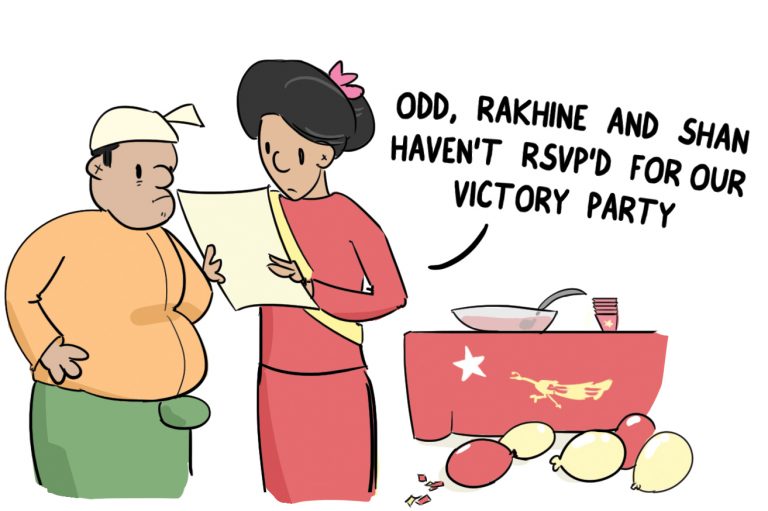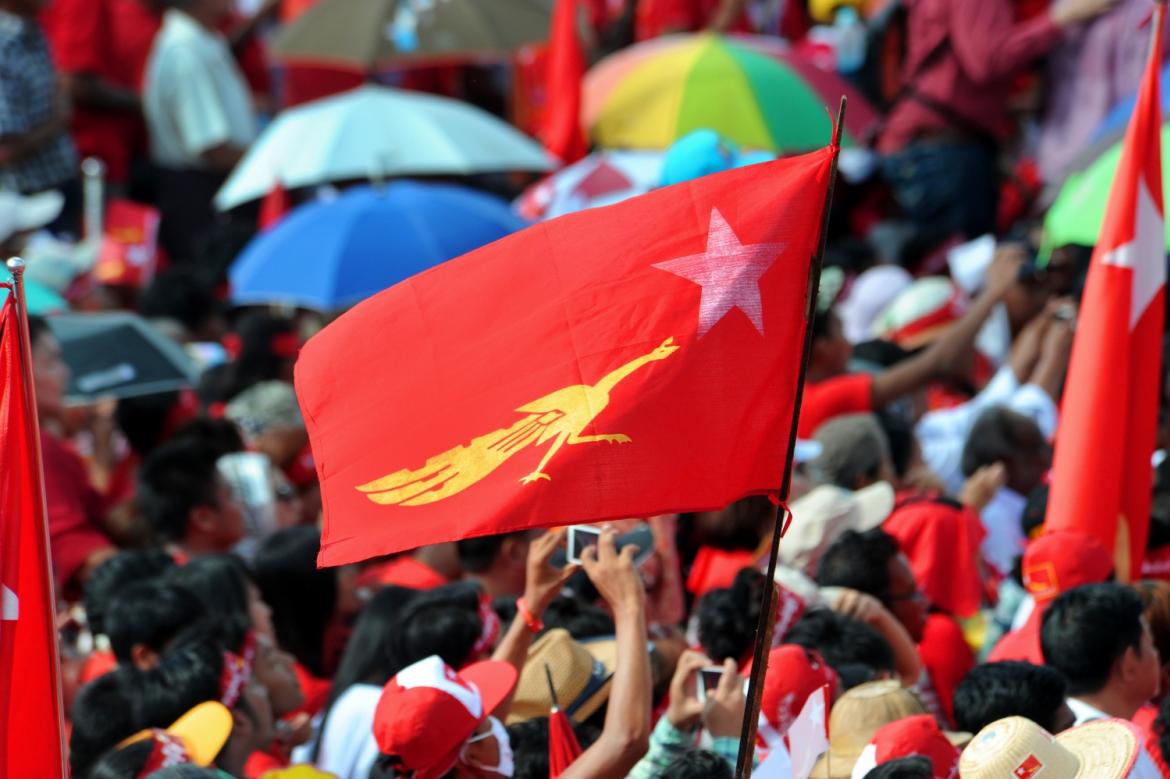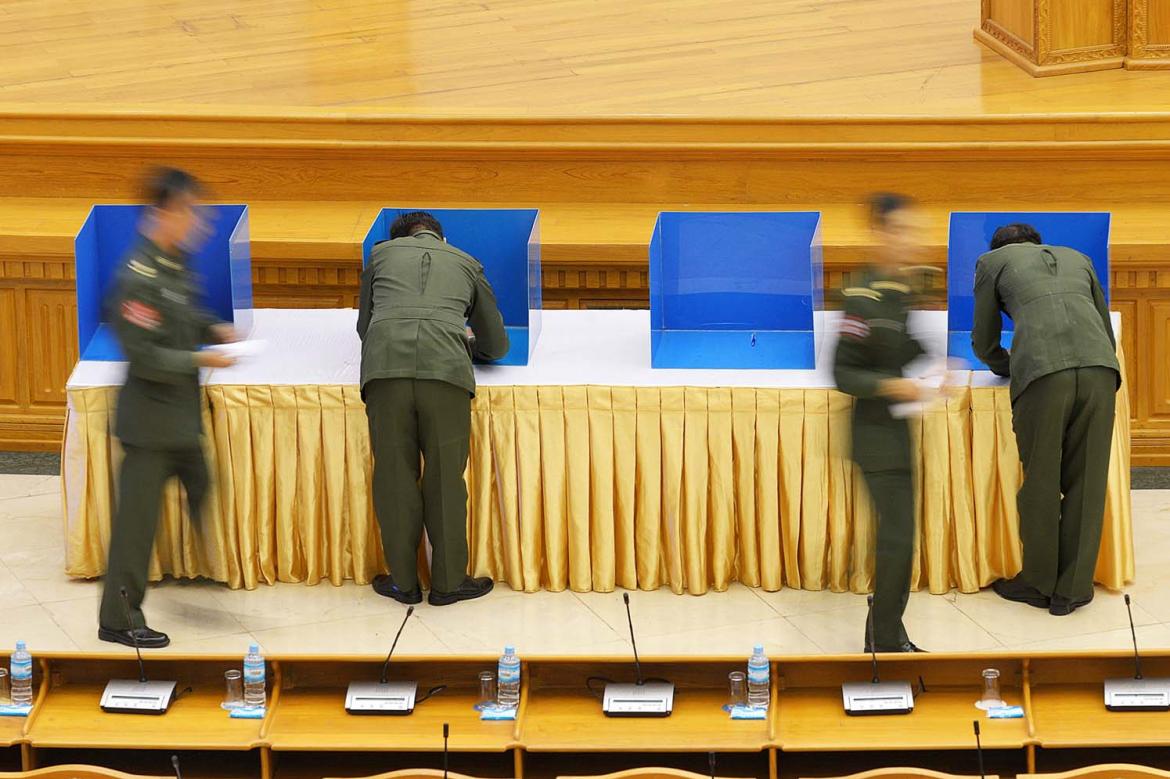top25.jpg

Information Minister U Ye Htut, student leader Phyo Phyo Aung and Kachin Independence Army strongman General Gun Maw.
They did their work in the backrooms or out in the open. But all the influencers in Frontier’s Top 25 left their footprint in 2015.
1. U Than Shwe — Retired dictator
After the roadmap was drawn up, twelve years ago, Than Shwe implemented his masterplan religiously. Everything we have seen so far, including the elections, was by the book. His meeting with Daw Aung San Suu Kyi, earlier this month, has yielded an “agreement”. Has the former military strongman promised Daw Suu the Presidency, in exchange for continued impunity of the former army leadership?
2. Daw Aung San Suu Kyi – Election winner
Even though some cracks have appeared in her varnish, the Lady still has the full support of the populace. She will finally rule the country, which she feels is her “destiny”. With expectations being so high, one wonders how long popular support for her NLD-government will last.
3. U Thein Sein – USDP chairman
President U Thein Sein started the reform process in 2011 and won the power battle for the USDP-chairmanship in August 2015. It proved to be a pyrrhic victory: the ruling party suffered a landslide defeat in the elections. Still, as the de facto leader of the country for another three months U Thein Sein remains an influential figure in Myanmar politics.
4. Senior General Min Aung Hlaing – Commander-in-Chief
The army controls three ministries, its own budget, and 25 percent of the parliamentarians. Also, Commander-in-Chief Min Aung Hlaing is an important player in the security and defense council. The army majority in this council makes it possible to stage a “constitutional coup” when the Tatmadaw deems it necessary.
5. U Aung Min – Peace maker
Support more independent journalism like this. Sign up to be a Frontier member.
Former Minister for Railways U Aung Min is the driving force on the government side in the peace negotiations, which have yielded a (flawed) nationwide ceasefire accord. He is widely considered the architect of the peace, although the process is nowhere near completed.
6. Gun Maw – KIA strong man
The KIA was among the most notable absentees when the national ceasefire accord was signed by the government and eight armed ethnic groups in October. In mid-March KIA’s vice chief of staff, General Gun Maw, visited Nay Pyi Taw as a member of the first KIA delegation to hold bilateral talks with the government since a ceasefire between the two sides collapsed in 2011. Kachin harbours hard wood and gem stones in abundance, so for now the KIA continues to cherish the status quo.
7. Bao Youxiang – Still not playing ball
Bao Youxiang’s United Wa State Army, said to be the largest armed ethnic group in Myanmar with an estimated 30,000 troops, was another conspicuous absentee from the October ceasefire agreement. An October report by Global Witness said individuals with connections to the UWSA were some of the biggest beneficiaries of Myanmar’s jade trade. The report named Bao Youxiang’s son-in-law, Aik Haw, as a representative of Myanmar Takaung Gems, which together with four other companies owns 50 jade mines and realised pre-tax sales of more than $100 million at the Myanmar gems emporiums in 2013 and 2014.
8. Thura U Shwe Mann – Cat with 9 lives
As the Speaker of the Pyithu Hluttaw Thura U Shwe Mann controlled the parliamentary agenda. He also controlled the USDP, until he was ousted in August. Even though he lost the race for his constituency Phyu, his close relationship with Aung San Suu Kyi will most probably land him a seat in the next government.
9. Cardinal Maung Bo – Myanmar’s moral conscience
Charles Maung Bo became Myanmar’s first ever Cardinal in February. The Archbishop of Yangon has been a voice of reason this year, calling for religious tolerance.
10. Maung Maung Ohn – Did a tough job
As Chief Minister in Rakhine State, U Maung Maung Ohn, an army general, was able to deal with the issues in Myanmar’s most explosive state fairly well. Friend and foe agreed that he did a decent job. He stepped down to compete for a seat in Rakhine State’s Ann constituency, which he won.
11. U Thant Myint-U – Opinion maker
The grandson of former UN Secretary-General U Thant is head of the Yangon Heritage Trust, an acclaimed author, and a special advisor to President U Thein Sein. U Thant Myint-U has been heavily involved in the peace process and has responded with cautious optimism to the signing of the national ceasefire agreement in October. He has also been a key advocate for the preservation of heritage architecture in Yangon.
12. Roland Kobia – EU Ambassador
Roland Kobia, a Belgian citizen, leads the EU delegation in Myanmar and has exerted both moral and financial influence. The EU was at the forefront when it spoke out about the Rakhine State Action Plan and the controversial protection of race and religion laws. It also has funded the Myanmar Peace Center and has initiated a multi-donor peace fund. For the period 2014-2020 the EU allocated US$858 million in bilateral assistance.
13. U Wirathu – Ma Ba Tha’s bad boy
The most vocal of the monks in the nationalist movement known as Ma Ba Tha has not had much to say since the November election. Ma Ba Tha was regarded as a supporter of the Union Solidarity and Development Party, but the NLD swept the polls. Ma Ba Tha monks were influential in the passing of four controversial race and religion laws, thought to target Muslims especially.
14. Ma Sabay Phyu – Activist
The Kachin activist has been vocal during Myanmar’s transition, speaking out on issues ranging from freedom of expression to minority rights to gender equality. In October, her husband Ko Patrick Khum Jaa Lee was arrested, accused of sharing a photo of a man in Kachin dress standing on the head of Senior General Min Aung Hlaing, a charge he denies. Ma Sabe Phyu has attended all of her husband’s hearings and has criticised the court for not considering his ill health – he has asthma and has suffered from strokes – in denying him bail.
15. Phyo Phyo Aung – Student leader
Currently detained in Tharawaddy prison, Bago Region, the leader of the All Burma Federation of Student Unions was arrested as part of the student protests that ended with a heavy police crackdown at Letpadan in March. Students had been marching from Mandalay to Yangon to protest against a new National Education Bill. In November, her husband Ko Lin Htet Naing was arrested for his role in the protest. Dozens of student protestors remain under trial.
16. U Aung Ko Win – KBZ chairman
Kanbawza Group of Companies, one of the country’s largest conglomerates, includes KBZ Bank, which is said to have the country’s largest branch network, with 250 branches. In its 2015 survey on corporate transparency, the Myanmar Centre for Responsible Business ranked the Kanbawza Group 3rd (after Serge Pun and Associates and the Max Myanmar Group of Companies), down from 1st in 2014. The KBZ Group was active in helping with the supply and distribution of aid and relief supplies to flood affected areas in July and August.
17. U Aung Thaung – Spin doctor hardliner kicks the bucket
The former military hardliner, whose family is one of the wealthiest in Myanmar, died in July from a stroke. Opposition activists allege that U Aung Thaung played a leading role in an attack on a National League for Democracy motorcade at Depayin in Sagaing Region in 2003. Dozens of NLD supporters died in the attack. U Aung Thaung was also accused of playing a role in instigating sectarian violence that has left scores dead in Myanmar since 2012, an allegation he described as “nonsense”. He was blacklisted in 2014 by the US, which accused him of “intentionally undermining the positive political and economic transition in Burma”.
18. U Ye Htut – Facebook minister
The former lieutenant colonel in the Tatmadaw was appointed Information Minister in August 2014 following the resignation of U Aung Kyi, and became one of the most visible faces in President U Thein Sein’s government. Known as the “minister of Facebook” because of his prolific use of the social media site, U Ye Htut said in December he will not seek position in the next government because he wants to spend more time with his family.
19. Dr Tin Mar Aung – The Lady’s assistant
Not many people know her, but Dr Tin Mar Aung wields power as she is Daw Aung San Suu Kyi’s assistant. The NLD is centrally organized, with all power resting with the Lady. This means that in the jockeying for position Dr Tin Mar Aung plays a crucial role as gatekeeper.
20. U Serge Pun – Tycoon
The tycoon has been busy since Myanmar’s reform process began, launching many projects, including three big real estate developments: Star City on Yangon’s outskirts, the Landmark project in downtown Yangon and KrisPlaza in Nay Pyi Taw. Speaking in July at the annual meeting of First Myanmar Investment, Mr Pun said the company would focus on three areas: financial services, real estate and healthcare.
21. U Steven Law – Blacklisted, but doing well
Despite being subject to US sanctions, the business interests of U Steven Law, one of Myanmar’s most reclusive cronies, have hardly suffered during Myanmar’s transition. Asia World was started in 1992 by Mr Law’s father, the late Lo Hsing Han, a Kokang Chinese drug trafficker who became a business tycoon. The company is now one of the biggest conglomerates in Myanmar.
22. Dr Nyo Nyo Thin – Crusader
Despite losing her seat as an independent candidate in Yangon’s Bahan Township in November’s election, the fiery politician has won some notable victories in her crusade against corruption as a member of Yangon’s Regional Parliament. She was an active voice in the re-tendering of a “New City” project in western Yangon and was also an opponent of the five development projects close to Shwedagon Pagoda, which were cancelled in July.
23. Michael Moe Myint – Oil & gas tycoon
The former pilot for General Ne Win chairs the MPRL E&P Group of Companies, one of the biggest domestic players in the oil and gas sector. In 2013, British Virgin Islands-registered MPRL was awarded two of 18 onshore blocks opened to tender, although it will be interesting to see how the group’s performance is affected by the oil price slump.
24. U Htay Oo – The gracious loser
The former general became the de factor leader of the Union Solidarity and Development Party after the putsch against Thura U Shwe Mann in August. But that wasn’t enough to win his seat in the November election, which he lost to the National League for Democracy candidate. He accepted defeat graciously. Will there be a role in the next government for the former Minister for Agriculture and Irrigation?
25. Daw Khin Waing Kyi – NDF’s iron lady
National Democratic Force Upper house MP Khin Waing Kyi launched a proposal to introduce proportional representation. She also cozied up to Ma Ba Tha and proved to be one of the most hardcore nationalist voices in the democratic contingent in Nay Pyi Taw.
…and a bad year for some:
Tay Za – Controversial entrepeneur
Asian Wings, considered to be a proxy airline of U Tay Za, went bankrupt, which fueled speculation that his other airline, Air Bagan, would face the same fate. While other cronies are cleaning up their act, Tay Za has been described by some journalists as becoming ever more erratic.
U Shwe Mann – Speaker on the way out
The parliament speaker might have been right in his pre-election assessment that the Union Solidarity and Democracy Party had to change its act or face annihilation. He was ousted on August 11 as the party chairman and then he lost in his constituency Phyu on election day. When the new parliament is installed at the end of January, Thura Shwe Mann has to step down as the Speaker of the Pyithu Hluttaw. He will be a (sort of) ordinary citizen again.
U Thein Sein – Ruling party chief
Facing increasing criticism that he was backtracking on his reforms, President U Thein Sein must have enjoyed 2011, 2012 and 2013 much more. After the USDP-party coup in August he took over the chairmanship of the party, only to be defeated heavily at the polls on November 8.
U Nay Zin Latt – NDP chairman
Former presidential adviser Nay Zin Latt founded the National Development Party, tipped by some to become the third force in Myanmar politics. A harsh reality check followed on election day. In total the NDP contested 357 seats nationwide. Of the 100 seats it contested for the two houses of parliament it won none.
Dr Stephen Suen – Marga Landmark boss
Near the U Htaung Bo roundabout in downtown, the Yangon Dagon City project was going to be built. Ma Ba Tha protesters, claiming the US$300 million dollar development would damage the integrity of nearby Shwedagon pagoda, forced the axing of the project, which must have cost Marga Landmark chairman Dr Stephen Suen many a sleepless night.







